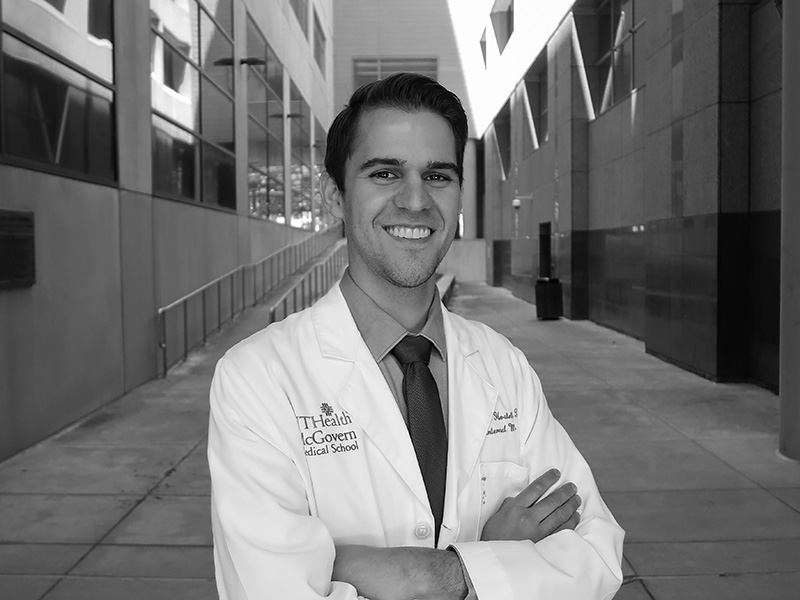Logan Hostetter, MD

Internal Medicine Resident, third year
I was on one of the ward services during the second year of my internal medicine residency. When the COVID patients started showing up in Houston, the Internal Medicine Department started looking for volunteers to serve on these COVID units – we were starting to make designated areas in the ICU or on the general floors. At that time, we didn’t know a lot about it – we had heard it was very infectious and there was mortality from the disease. So, they didn’t want to make anyone fill those roles, if they didn’t feel comfortable. We still had patients we had to take care of, so I volunteered for one of those COVID teams early on. I just remember the traffic in Houston has never been better. I remember driving to work one of the first days Houston was shut down, and I was probably one of the only cars on the road super early in the morning. At that point, it was taking 4 to 5 days for the COVID tests to come back, and in the first week we ended up taking care of 8 to 10 COVID positive patients and saw what the disease was doing. It was a very eerie experience, certainly something I won’t forget, especially early on.
I think our graduate medical education, especially our program director, Dr. Swails, had a very intent focus that residents, in particular, were protected. Their commitment to us was that we would not see patients who had COVID unless we had the proper equipment. Early on, our hospitals did a really good job providing us with protective equipment. The big thing was the N95 mask scarcity for a while – we were using the same mask for a few days, but we at least had the equipment to take care of those patients. I felt we had the appropriate gear for what we were going up against.
“Everyone who is in medicine always has an innate sense of responsibility to contribute to the furthering of medical education and educational knowledge.”
The graveness and vastness of COVID is something we’ll never forget – ever. On some of our teams, we had some of the first deaths in Houston from it; it’s really unexpected and there’s no preparing for that. It’s something that’s perpetual now – talking to families now in the ICU, people are expecting their loved one to be on the ventilator for one or two days. Early on we didn’t know what to tell people – now we know to tell people their loved one will be in the hospitals for weeks to months.
It’s very interesting, in medicine you typically have an algorithm for things you can do, but for COVID, early on there was no algorithm. It was, ‘hey maybe try hydroxychloroquine, maybe try plasma, maybe try this drug, give steroids, don’t give steroids, give anti-coagulates, don’t give anticoagulation.’ The academic frenzy of research and publications and amount of data that came out was overwhelming. What was being practiced was changing on a daily basis, and we didn’t know what was going to help, so it was, see what you can do so people don’t get worse. Now there are accepted guidelines of plasma, steroids, remdesivir. There are things now that we feel we can do, and sometimes as a doctor you feel like you have to do something. Now there is some standard of care for these patients, but there are still limitations.
The pandemic really points to the academic rigor of medicine and lifelong learning, and that there’s always things to things to be discovered and advances to be had. Everyone who is in medicine always has an innate sense of responsibility to contribute to the furthering of medical education and educational knowledge. I am truly privileged to have been a part of this during my training. I have learned a lot, and I am now very good at taking care of ARDS. You definitely appreciate your colleagues and the community who were supportive of you by wearing masks – it went a long way, that’s for sure. All of the incredible people you get to work with, from the nurses and other house staff and attendings, people were making a lot of sacrifices, not knowing what taking care of COVID patients would mean to them. And I’m grateful for our supportive leadership – Dr. Swails made a lot of sacrifices and cares a lot about the residents. It was a tough year, but I learned a lot and will never forget.
